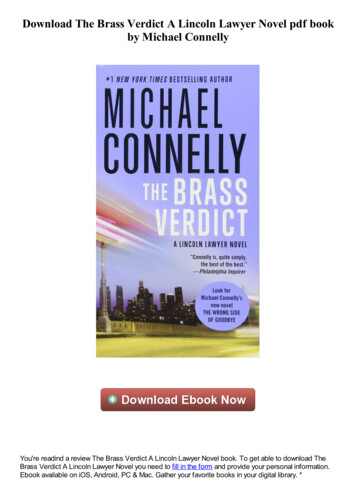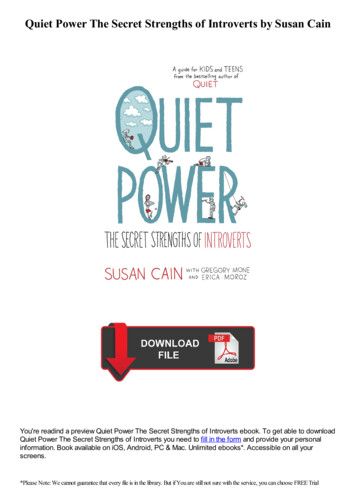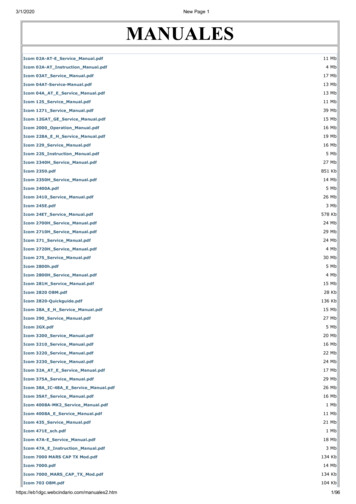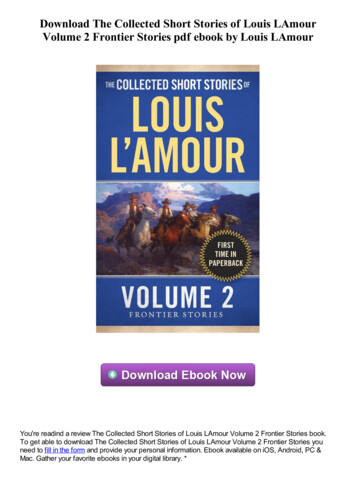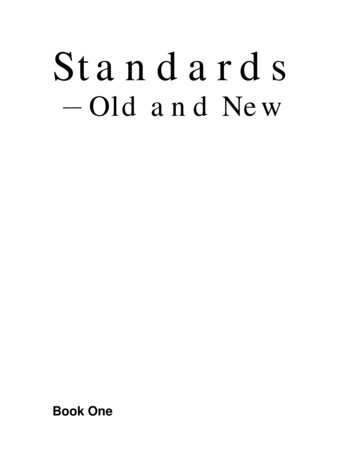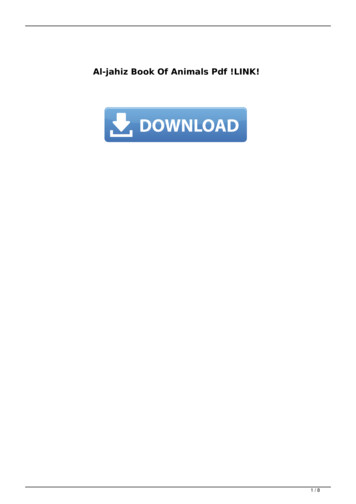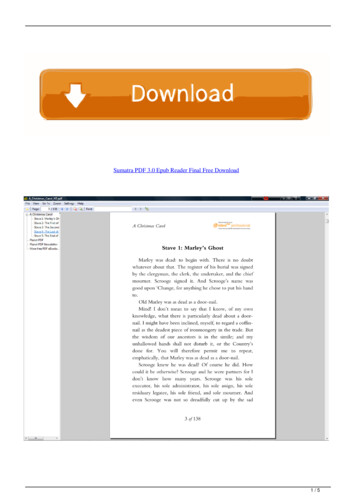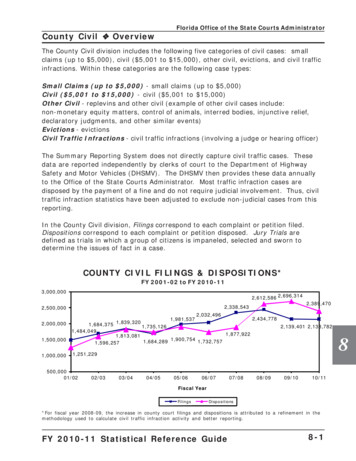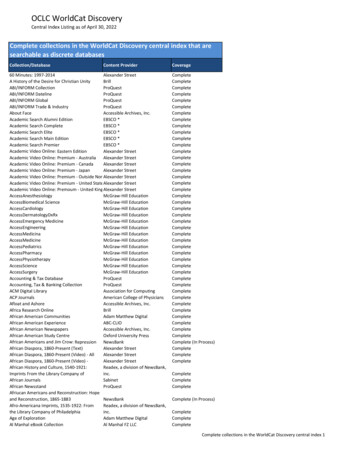
Transcription
1818CIVIL SOCIETY ASSESSMENTMay 2016This publication was produced for review by the United States Agency for InternationalDevelopment. It was produced by independent consultants Guilain Denoeux and Dima Toukan,with contribution from Hanna Theodorie and Patricia Hunter (USAID/DCHA) on behalf ofManagement Systems International, a Tetra Tech Company.
CIVIL SOCIETYASSESSMENT REPORTMay 2016USAID/Jordan Monitoring & Evaluation Support Project (MESP)Contracted Under AID-278-C-13-00009Disclaimer:The author’s views expressed in this publication do not necessarily reflect the views of the United StatesAgency for International Development or the United States Government.ii
CONTENTSAcronyms. ivExecutive Summary . 6Introduction . 15Background and Objectives. 15Methodology . 15Organization of the Report . 16Section I: Environment, Profile and Trends . 17Section II: Contributions . 31Section III: Donor Engagement . 37Section IV: Perceptions . 40Section V: Challenges and Opportunities . 50Conclusions: Implications for USAID Programming . 53Assess Impact through Constituency Building . 53Support Strong Intermediary Organizations to Channel Assistance to Civil Society . 54Assist Organizations to Cultivate Local Donors and Explore Venture Philanthropy . 56Help Civil Society Improve its Public Image . 58Support Civic Education Programming that Advances Knowledge of Civil Society . 59Ensure “Congruence” in Programming . 62Annexes . 64Annex I: Statement of Work . 64Annex II: Design Report. 74Annex III: Summary of KIIs and FGD . 81Annex IV: List of Key Informants and FG Participants . 82Annex V: Short Bibliography . 87Annex VI: Workplan . 89Annex VII: Discussion Guides . 91iii
MoSDMP(s)NDINDO(s)NfPC(s)Anti-terrorism lawCommunity Based Organization(s)Center for Defending Freedom of JournalistsCivic Initiatives Support [Program]Council of MinistersCivil Society Organization(s)Civil Society ProjectCivil Society SectorCounter(ing) Violent Extremism or Counter Violent ExtremistDemocracy, Human Rights and GovernanceFocus Group DiscussionGeneral Federation of Jordanian WomenGovernment of JordanGender Social FundGeneral Union of Voluntary SocietiesAl-Hayat Center for Civil Society DevelopmentInternational Convention on Civil and Political RightsInternational Center for Not-for-Profit LawIntermediary OrganizationsInternational Republican InstituteIslamic State in Iraq and al-ShamJordanian-American Commission for Educational ExchangeJustice Center for Legal AidJordanian Dinar(s)Jordan Investors AssociationJordanian National Commission for WomenJordanian National Forum for WomenJordan Hashemite Fund for Human DevelopmentJordanian Women’s UnionKey Informant Interview(s)Lesbian, gay, bisexual, and transgenderMonitoring and evaluationMinistry of EducationMinistry of Industry and TradeMinistry of Municipal AffairsMinistry of Planning and International CooperationMinistry of Social DevelopmentMember(s) of ParliamentNational Democratic InstituteNational Development Organization(s) [See also RONGO(s)]Not-for-Profit Company(ies)iv
nmental Organization(s)Opportunities for All NetworksPhoenix Center for Economic and Informatics StudiesRoyal Non-Governmental Organization(s)Umbrella Organization(s)United States GovernmentViolent Extremism or Violent ExtremistVenture PhilanthropyVenture Philanthropy Organization(s)v
EXECUTIVE SUMMARYThe Civil Society Assessment has three main objectives: to provide an up-to-date and empiricallygrounded analysis of the civil society sector (CSS) in Jordan and the challenges it faces; to inform themid-term evaluation of USAID’s Civic Initiatives Support (CIS) Program and its workplan; and to informbroader USAID civil society assistance programming. The assessment used a primarily qualitativeapproach. Following extensive consultations with CIS staff and a comprehensive literature review,fieldwork began on May 24, 2015 and continued through June 18, 2015. Assessment findings are basedon 12 focus group discussions (FGDs) and semi-structured interviews with 73 key informants conductedin Mafraq, Irbid, Amman, Zarqa, Ma an, and Tafileh. Informants include a cross-section of Government ofJordan (GoJ) officials at the national, governorate, and local levels; members of parliament (MPs) andformer MPs; mayors and municipal council members; leaders and staff of civil society organizations(CSOs); civil society experts (journalists, academics, lawyers, public figures); representatives of thedonor community; and staff from USAID implementing partners.The space Jordanian CSOs enjoy is influenced heavily by the restrictive Law on Societies of 2008 asamended in 2009, as well as by key provisions in other texts relevant to civil society operations,including the Penal Code, which contains several provisions that curb free expression (particular Articles149 and 191); the 2004 Law on Public Gatherings (especially Article 4); the 2007 Press and PublicationsLaw, as amended in 2012 (especially Article 5 and 38b); and the 2006 Anti-Terrorism Law as amended inJune 2014. This legislation does not create an enabling environment for civil society and in the past fewyears, several of the above laws have been revised in a more restrictive direction. Consequently, theconstraints that they create for civil society activity have become even more significant.Six contextual variables shape civil society activity in Jordan. The first is the regional crisis, which hasplaced a premium on security and stability; reduced both the demand for political reform and thereadiness of the authorities to supply it; created legitimate security concerns that provide excuses forthe authorities to clamp down on independent activity; and reinforced the predisposition of manyofficials to be suspicious of any forms of autonomous civic activities and to see them as a direct orimplicit challenge to the state. The second factor is the Syrian refugee crisis, which has distorted civilsociety activity by prompting many CSOs to follow donors’ lead and reorient their activities to tacklethis new challenge, often in ways that do not align with their mission, strengths, and weaknesses. Thethird contextual factor is the pervasive distrust of civil society that prevails in many government circles.The perception of civil society as disloyal and bent on promoting foreign agendas appears to beparticularly pronounced among second- and third-tier officials, who also happen to be those who cancomplicate the lives of civil society activists on a daily basis. Furthermore, non-governmentalorganizations (NGOs) active in sensitive or vulnerable geographic areas may experience interference bythe security services (for instance during CSO board elections). Various forms of intimidation andharassment (e.g., detailed audits of CSOs’ accounts and records, or public defamation campaigns thatentail the dissemination of allegations and rumors against leaders of particular CSOs) are also used. Thefourth factor is the critical role of discretionary power, personal relationships, and political access. Asthe laws that shape civil society activity contain vague provisions open to contradictory interpretations,officials enjoy a great deal of discretion in applying them. A related factor is the importance for CSOs tobuild personal relationships with decision-makers. Cultivating and maintaining access to power is criticalto a CSO’s ability to get things done by opening doors, bypassing regulations, and avoiding restrictions.Enjoying the goodwill of influential figures is a vital form of insurance if, and when, a CSO comes underattack. The fifth factor is the extent to which a CSO’s thematic focus and capacities enable it to supportor complement government action. As a rule, the more that is the case, the greater the space theauthorities will allow for that organization. Finally, location matters a great deal. Amman-based CSOs6
enjoy much greater freedom to conduct “sensitive” activities and hold public meetings than those in thegovernorates.The sector has experienced both striking continuities and a few important changes in the past decade.Nine main continuities can be detected. First, the vast majority of CSOs in Jordan remain charity- andservice-delivery focused, although some of them – mostly Royal NGOs (RONGOs) and a few nationalNGOs – tackle broader development issues. Community-based Organizations (CBOs) representapproximately 80 percent of all CSOs; they are concerned exclusively with community development andthe provision of basic humanitarian and relief assistance. Second, the advocacy component of civilsociety – defined as CSOs for which advocacy is the primary mission – remains extremely small andunder-developed. Among the small number of advocacy CSOs, a small minority concentrate ondemocracy, human rights, and governance (DRG) issues. They are based exclusively in Amman and arethink tanks or policy institutes as much as advocacy groups. Third, civil society remains donor-drivenand donor-dependent. Most CSOs are established first and foremost to access donor funding. As aresult, they lack a clear mission and an organic connection to the communities or constituencies theyclaim to serve. Instead, they react to the priorities of donors and thus tend to be project- or activitydriven. Fourth, the level of professionalism and the quality of governance across the sector remains lowoverall, despite islands of (sometimes significant) improvements. For instance, still too few CSOsunderstand, let alone act on, the need to be mission-driven; except for RONGOs, most CSOs lack clearmission statements; only a few of them engage in strategic planning; CSO boards are typically ineffectiveand lack genuine power; and most CSOs have weak management systems. Fifth, there remains a hugegap between civil society and society: instead of developing organically out of society to reflect its needsand aspirations, civil society exists side by side with it. Sixth, the vast majority of Jordanian CSOs are stillinsufficiently specialized and spread themselves too thin. As a result, they do not allocate their limitedresources effectively. Seventh, the sector remains extremely fragmented and the level of cooperation,sharing of ideas and coordination among CSOs remains low. CSOs have been unable to form durablealliances and coalitions to articulate a coherent and compelling vision of the changes to which theyaspire, and how they propose to bring about those changes. While they bemoan this state of affairs, theydemonstrate little inclination or capacity to change it. Eighth, most Jordanians do not understand whatcivil society is, nor do they appreciate its contributions, limited as those contributions may be. Mediaoutlets continue to play a generally unhelpful role in this regard: their coverage of civil society remainssuperficial, frequently negative, and heavily tilted toward RONGOs, which receive more extensive andpositive attention. Finally, ninth, the extent and quality of the sector’s engagement with governmententities remain very limited.These important continuities notwithstanding, some significant changes have affected civil society. First,the sector has experienced exponential growth since the late 2000s. In the past seven years, the numberof officially registered CSOs has tripled from approximately 1,500 in 2008 to over 4,600 today. Thisphenomenon, however, does not reflect a surge in civic consciousness and activism, evidenced for oneby the negligent role that civil society played in stirring such consciousness during the short lived ArabSpring in Jordan.1 Instead, it is driven primarily by individuals seeking to access the funding that donorsallocate for civil society assistance. Second, since the late 2000s, the government has steadily tightenedits control over the sector, a process that appears to be accelerating. Third, the GoJ’s rhetoric aboutcivil society has become increasingly bifurcated and contradictory. Official statements – particularly fromthe Palace – praise civil society and underscore the critical contributions it makes to address theproblems confronting the kingdom. This same discourse urges partnerships between state agencies, theprivate sector, and CSOs and portrays civil society as a key source of information and feedback for agovernment bent on consultation and dialogue. In contradiction, key GoJ figures have repeatedly been1Yom, Sean, Arab Civil Society after the Arab Spring: Weaker but Deeper, Middle East Institute, October 22, 2015.7
critical of civil society, emphasizing its flaws and dismissing its role in national development. Theseattacks then are relayed and amplified by sympathetic media outlets, especially those under governmentcontrol, which helps negative views of civil society gain widespread acceptance in public opinion. Fourth,a handful of NGOs active in the DRG area are more visible. They have earned a degree of publicrecognition and respect through the quality of their monitoring, lobbying, advocacy and policy-analysiswork. Fifth, there is a growing recognition by some CSOs of the importance of strategic planning, beingmission-driven, consulting with stakeholders, and engaging in monitoring and evaluation (M&E) ofprojects and activities. Nonetheless, organizations that embrace these practices remain the exception,not the rule.FGDs and key informant interviews yielded important insights about stakeholders’ views of civil society’scontributions to six national objectives: social-sector development; economic growth; improved servicedelivery; political reform; countering violent extremism (CVE); and coping with the humanitarian andsocioeconomic impacts of the Syrian refugee crisis. Overall, respondents overwhelmingly assessed civilsociety’s contributions as ranging from limited (as for service delivery) to insignificant (countering VE).Respondents consistently felt that out of the six objectives, civil society contributes most to serviceprovision, which remains the primary and often exclusive focus of the vast majority of CSOs in Jordan.Even then, interviewees also generally agreed that the sector’s performance in this area suffers fromseveral flaws: the quality of the services offered often is low and the range of beneficiaries limited;services do not necessarily match the primary needs of recipients, in part because CSOs rarely conductneeds assessments; and civil society actors have failed to prioritize improving accessibility to the servicesthey provide, the quality of these services, and how to reach out to the most vulnerable populations.With regard to both social sector development and economic growth, civil society’s contributions weregenerally viewed as marginal. Civil society has had limited successes in mitigating some of the worstmanifestations of social marginality and economic stagnation, but its efforts in this area remain largely onthe margin and do not address root causes. The growing social needs of the population, which havebeen compounded by the influx of Syrian refugees, have exceeded civil society’s limited capacities.The vast majority of informants were of the opinion that civil society plays a largely insignificant role infacilitating political reform, particularly if performance in this area is measured in terms of policy change,new legislation, or shifts in political norms or behavior. Views regarding some of the better-knownnational-level DRG organizations were mixed. While civil society experts noted that these organizationshave become more professional and competent and that they perform useful watchdog functions,including documenting human rights violations and engaging in election and parliamentary monitoring,they also recognize that while the monitoring, lobbying, and policy analysis are valuable, they lackbroader impact on the polity and society. In fact, there is a general sentiment that the issues NGOswork on have low grassroots mobilization potential and that their inability to rally a large swath of theJordanian public remains a structural impediment to their effectiveness, due to both supply and demandfactors.Respondents overwhelmingly suggested that CSOs have played a negligible role in the fight against VE,whether in terms of addressing root causes, rebutting extremist thinking, developing compellingcounter-narratives, or promoting tolerance in society. This poor record reflects these CSOs’ limitations,although it is also true that the government has not made a concerted effort to harness civil society totackle the VE challenge. As for the Syrian refugee crisis, its magnitude has overwhelmed the limitedcapacities of civil society. Civil society has not behaved as an autonomous actor in tackling this crisis.Instead, it has operated largely as a sub-contractor for international organizations, which have set thepace of operations on the ground. Civil society’s work with Syrian refugees has been mostly small-scale,ad hoc, and project- or activity-centered. Leaders and staff of CSOs working on refugee issuesexpressed some resentment at foreign relief agencies; they complained that these agencies have takenadvantage of local organizations, relying on them to assume the brunt of the work, but without helping8
them build their capacities. Local CSOs want their relationship with foreign implementers to becomemore equal in terms of joint participation for project vision and design, with an intent to developcapacity of the local partner to implement projects independently.Despite modest gains over the years, most women’s organizations confront a unique set of challenges.2Their internal governance remains undemocratic, opaque and personality-driven; rank-and-file membersoften feel that leadership is not accountable and cannot be changed. The extreme fragmentation of thefield and debilitating competition pits women’s organizations against each other. There is no unifyingvision among women’s groups on how to enhance the status and influence of women in Jordan. Mostimportantly, women’s organizations lack broad constituencies; the vast majority of Jordanian women donot recognize themselves in these organizations, the language they use, the causes they promote, theapproach they use to promote, and the programming in which they engage. This problem is particularlyacute for rights-based organizations, which, as one interviewee noted, “keep pushing programs to try toturn Jordanian women into [western-style] activists.” Nonetheless, similar problems exist in manywomen’s organizations focused on service delivery, which offer services that are not necessarily thosethat women most want.Interviewees and participants in FGDs consistently expressed criticism of donor engagement, citing lackof a strategic approach to supporting the sector and programming that is overwhelmingly project- oractivity- centered as opposed to outcome-driven. Civil society analysts were particularly critical of whatthey viewed as donors’ emphasis on merely “moving money out of the door” – doling out grants andtechnical assistance with little thought given to impact or a shared understanding of what success infunding the sector might look like. The team heard repeatedly that donors “just want to check the box,”“spend their civil society budget,” “satisfy their own reporting requirements,” and use funding to signaltheir support for particular issues (including some that backfire in the Jordanian context), but seemindifferent as to whether their civil society programming actually is making a difference on the ground.Interviewees felt that too much assistance has taken the form of off-the-shelf, repetitious andunimaginative training and other “capacity-building” activities that have emphasized form and processover substance and outcome; have paid insufficient attention to organizational strengthening, as opposedto training individuals; and have been insufficiently geared to the specific profiles, strengths andweaknesses of the particular organizations donors have sought to strengthen. They believed donorshave paid insufficient attention to the serious governance issues that continue to plague the sector,despite years of generous donor funding for “capacity building.” Civil society activists consistentlycomplained about donors’ unwillingness to cover operational costs, long-term investment in staffdevelopment, and the capacity to undertake meaningful research. They described this reluctance as amajor impediment to actual capacity-building.One of the most adverse effects of donor programming has been the increasing upward accountabilityto donors at the expense of downward accountability to would-be constituents. Gaining and retainingaccess to donor funding and satisfying donors’ reporting requirements remains far more important toCSOs than representing the needs and aspirations of issue-based constituencies or particularcommunities. Lack of coordination among donors was a recurrent complaint of civil society activistswho saw it as one of the main reasons for the continued fragmentation, infighting, corruption, andduplication of activities that prevail. Civil society activists and experts also frequently portrayed CSOs ashostages to sudden and significant changes in donors’ agendas. They claimed that the abrupt refocusingof donors’ efforts toward Syrian refugees has had a major and primarily negative impact on the sector. InExamples of Women’s organizations in Jordan include the General Federation of Jordanian Women, the Jordanian Women’sUnion, the Human Forum for Women’s Rights, the Arab Women Media Center, the Arab Women’s Legal Network and theJordanian National Forum for Women, Arab Women’s Organization, among others.29
addition, they expressed frustration with donors’ branding requirements and cumbersome andcomplicated grant-application procedures.The fieldwork also yielded insights into perceptions of and by civil society. For instance, civil societyactors seem strikingly aware of and willing to acknowledge publicly the serious failings of their sector,and furthermore, appear resigned to those flaws and skeptical that they have the power to change astate of affairs that reflects powerful cultural, political, and economic forces. Many civil society activists(especially CBO members) have a superficial understanding of both the concept of civil society and therealities of the sector in Jordan. They share two main views: that civil society’s role is to “fill the gaps”left by the government’s action, especially in the area of service delivery; and that, as it currently existsin Jordan, civil society is mostly a business driven by, as one respondent put it, “professionals looking forwork,” people whose drive for change is lacking. For their part, Jordanian citizens have at best a shallowunderstanding of what civil society is and the functions it is supposed to perform. The vast majority ofrespondents could not name specific CSOs except for a few RONGOs. Jordanian citizens also believethat civil society’s impact is extremely limited, especially with regard to effecting public policy. Even onservice delivery, civil society received mixed grades: RONGOs were credited with the vast majority ofsuccesses’ nonetheless; civil society’s performance was viewed as neither adequate nor commensuratewith the resources donors have poured in the sector. While citizens do not know much about civilsociety, FGDs suggested they have a generally negative view of it. By and large, they buy into thenarrative of the sector being donor-driven, ripe with corruption and infighting, and driven byopportunistic, self-interested behavior. Interviews confirmed that opinions about RONGOs aregenerally more positive, particularly with regard to professionalism and impact. Citizens generally feelthat the government should closely monitor the activities of civil society and maintain tight control overit, which underscores their pervasive suspicion of and skepticism toward, the sector.Civil society regards the government as generally unsupportive of its role and unwilling to engage in atrue partnership with it. It views government as bent on controlling or coopting the sector rather thanhelping it grow, and resents government officials’ tendency to paint it in a bad light, including to scorepoints with public opinion. Many senior government officials have a skin-deep understanding of what civilsociety actually represents, the functions it performs, and what it could contribute to Jordan’sdevelopment. While interviews confirmed that there is no single GoJ perspective on civil society, theyalso underscored the generally negative view of it that prevails in government circles. Governmentofficials tend to be dismissive of the motivations of civil society activists, how they approach their work,and most importantly, the impact of their activities. They repeatedly complained that civil societyactivists are more preoccupied with promoting the agendas of donors that don’t always reflect localpriorities. GoJ officials are willing to acknowledge civil society a limited part in providing social servicesand in furthering development objectives, but they do not recognize a legitimate role for it in such areasas oversight, policy-making, or advancing political reform. In general, they believed that civil society’srole should be limited to helping government provide services and alleviate poverty. They viewed civilsociety’s role through this limited and purely developmental lens. While during interviews they oftenused the mantra of civil society being “the government’s partner,” it was clear that the “partnership”relegates civil society to a subservient role. Overall, GoJ officials tend to view civil society as a source ofirritation, but one that must be tolerated – not so much because of its limited contributions, butbecause tolerating it is critical to the state’s international image and to maintaining the cooperation andgoodwill of donors.Government informants were consistently and openly critical of the way in which the donor communityhas conducted its civil society assistance activities. Their primary criticisms were that donors have beenlax in monitoring their programs and in demanding accountability from recipient organizations; that theyhave been insufficiently concerned with impact; and that flooding the sector with funding, combined withlack of coordination among themselves, has contributed heavily to corruption, duplication of activities,10
and waste. In addition, they uniformly complained about donors channeling funds to CSOs withoutadequately coordinating with the GoJ. They argued that this situation has fueled opacity within thesector and is largely responsible for the “chaos” that prevails in it – and which, in their opinion, it is nowthe resp
private sector, and CSOs and portrays civil society as a key source of information and feedback for a government bent on consultation and dialogue. In contradiction, key GoJ figures have repeatedly been 1 Yom, Sean, Arab Civil Society after the Arab Spring: Weaker but Deeper, Middle East Institute, October 22, 2015.
